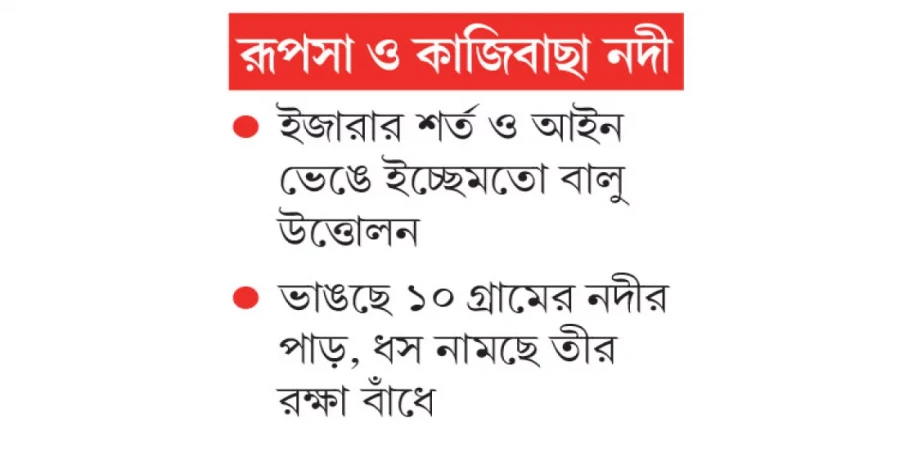
ছবি: ফাইল ছবি
In Khulna's Batiaghata Upazila, unregulated sand dredging is causing severe riverbank erosion and threatening the livelihoods of thousands. While the Water Development Board (WDB) works to reinforce embankments along the Rupsha and Kazibacha rivers, unauthorized sand extraction continues just 100 meters from the protective barriers, violating laws prohibiting dredging within one kilometer of vital structures such as embankments and bridges.
Villages like South Tetultala in Jalma Union, as well as areas surrounding Rupsha and Kazibacha rivers, face dire consequences. At least nine villages have already lost homes, farmlands, and fisheries to the advancing rivers, leaving hundreds of families destitute. Residents live in constant fear of losing their remaining properties and homes, with many contemplating relocation. Despite the visible destruction, local authorities have taken no effective measures to curb the illegal activities.
Reports reveal that around 20 dredgers operate day and night in these areas, extracting sand without regard for environmental or legal boundaries. Though the government officially leased the Rupsha-Kazibacha sand quarry for approximately 2.3 million BDT to Ali Reza Haider, unofficial control of the operations was allegedly held by Sheikh Sohel, a relative of former Prime Minister Sheikh Hasina. After the fall of the Awami League government, BNP leaders reportedly took control of the site. This lucrative business yields millions of taka annually, with sand extracted indiscriminately from various locations instead of designated zones.
The environmental and infrastructural damage is immense. More than three kilometers of riverbank across villages like Tetultala, Kachubuniya, and Purner Kheya have been eroded. In Tetultala, vast swathes of land, crops, and homes have already been consumed by the river. Residents like Ekramul Hossain describe how dredgers operate unabated, causing deep holes in the riverbed, which subsequently lead to landslides and embankment collapse. Another resident, Madhusudan Roy, laments that while businesses profit from the extracted sand, locals are left homeless and impoverished.
The WDB is spending vast amounts of public funds on repair projects, but the efforts are proving futile. Over 130 million BDT has been allocated for riverbank protection in the 2023-24 fiscal year alone. However, erosion caused by uncontrolled sand extraction has rendered many repairs temporary. For instance, a 210-meter embankment segment in Purner Kheya repaired for 6 million BDT was partially destroyed within a year. Similarly, a 12-crore BDT project to stabilize Kachubuniya’s riverbanks using concrete blocks remains incomplete and at risk.
Environmental activists attribute the inefficacy to a lack of coordination between the WDB and the district administration. The district administration grants sand leases to increase revenues, while the WDB spends on erosion control, creating a cycle of wasteful expenditure with no sustainable solution. Activists argue that prioritizing ecological and community welfare over short-term financial gain is essential.
Local officials acknowledge the issue but point to systemic challenges. Sharif Shawon, assistant commissioner (land) for Batiaghata, notes the environmental and infrastructural harm caused by unregulated sand extraction. The administration plans to designate zones where sand extraction can proceed without endangering nearby communities or infrastructure. Meanwhile, WDB officials emphasize that unless illegal dredging is stopped, their efforts to protect embankments will be in vain. Letters have been sent to relevant authorities, but enforcement remains weak.
Sutapa Bedajna, an environmentalist and general secretary of the Khulna Environmental Protection Platform, criticizes the lack of coordination between authorities. She urges a shift in priorities, advocating for a comprehensive approach to safeguard the environment and communities before considering commercial activities like sand leasing.
The district commissioner, Mohammad Saiful Islam, has promised to investigate the allegations and take necessary measures. However, the continued inaction and apparent conflict of interest among stakeholders leave vulnerable communities to bear the brunt of environmental degradation and governmental inefficiency.
repoter






